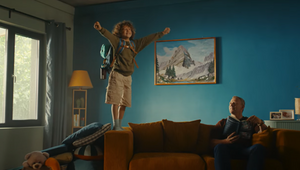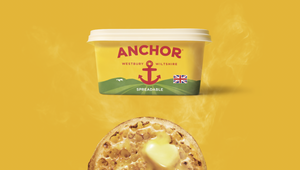
Why Havas Disguised Sunscreen as Face Paint for Football Fans

Fan paint is an essential in every football fanatic’s kit, and we’ve all seen some creative iterations of country flags painted on faces, backs or other body parts. However, even though most fans of the game are familiar with smearing paint on their face, they don’t seem to be that keen on sunscreen, our one most reliable way to prevent damage from the sun’s UV rays and save our skin.
This is why Havas UK took it upon themselves to collaborate with LifeJacket and their partner Melanoma UK, to create the Fan Paint campaign, supported by skin cancer survivor and former England footballer Paul Merson. The campaign started with Havas finding crucial research pointing to the fact that skin cancer rates have skyrocketed in the past 20 years, with that number set to double in the coming two decades and men being twice as likely to suffer the dire consequences.
Adam Hinson, senior strategist at Havas UK, explained that even though we’ve seen immense growth in the men’s grooming industry, as well as attempts from the industry to tackle toxic masculinity, men are ‘still unlikely to go near moisturisers and sun protection’. According to him, the male part of the population is also more likely to ignore skin abnormalities, the biggest signs of melanoma.
For this reason the agency reached out to LifeJacket, with the idea to create body paint that also dubbs as sunscreen. Sam Adio and Ken Abalos, the creatives behind the campaign said: “These manly men who can’t be arsed putting on sunscreen or who think they’re impervious to sunburn but cover themselves with paint. We loved the idea of “hacking” this behaviour to almost trojan horse sunscreen into their skin to help protect them.”
Besides this, LifeJacket are giving away 15,000 travel sachets of their sunscreen for free for those travelling to Qatar for the World Cup this year. And for those not attending the games in person, a pop-up activation at PUMA’s London Carnaby Street will allow fans to snatch some sunscreen in their team’s colours.
LBB’s Zoe Antonov spoke to creatives Sam and Ken, account manager Irina Patrichi, senior strategist Adam Hinson, as well as the founder of LifeJacket Billy Boulos, about the hard work that went into the campaign and the readiness of everybody involved to pull their weight in the face of the serious issue.

LBB> What was the brief for this campaign and how did you come up with the idea?
Sam & Ken> There wasn’t a brief really. This was a spec proactive idea that we came up with after reading that a lot of men don’t wear sunscreen. Havas London creative partner Elliot Harris then reached out to LifeJacket with the idea and to our delight, Billy Boulos got back to us saying they loved the idea and wanted to go on this journey with us. They even sent us a letter with a sunscreen sample box which was very nice of them. It was then that they told us how quickly skin cancer rates are increasing, and this project could help highlight that.
Adam> Skin cancer rates have exploded over the past 20 years, and are forecast to double over the next 20. Men are also twice as likely to die from skin cancer. Trouble is, most guys aren’t great at protecting themselves. Despite huge growth in the male grooming industry, many men are still unlikely to go near moisturisers and sun protection - it might be because they’re too greasy, perceived as products for women, or simply that they’ve never thought about the need to protect themselves.
Unfortunately, they’re also far more likely to ignore abnormalities on their skin, even though skin cancer is one of the most treatable, preventable cancers. This campaign was all about creating conversation amongst this group at the moments that matter to them - using live sport as a vehicle to change attitude and behaviour.
LBB> Tell me more about the development of the product and how it works.
Billy> At LifeJacket we have been working extensively in the lab on innovative UV blocking formulas that utilise mineral pigment technology rather than chemical, UV-absorbing filters. Mineral sunscreens reflect UV whereas chemical sunscreens absorb UV and convert it to heat which then dissipates from the skin. This work has taken us to some pretty interesting places and with Fan Paint we've even managed to almost entirely remove water which makes the mineral pigments really stay in place once applied to the skin (and therefore doing their protective job!). This waterless approach to formulations with the ability to utilise really intense colour pigments has helped make Fan Paint a truly unique piece of tech. As with all LifeJacket developments we've used the most skin compatible ingredients throughout, so the products not only feel good, but are suitable for even sensitive skin and dermatologically tested to boot.
LBB> What was it like working with Melanoma UK and how creatively involved were they in the process?
Sam & Ken> What was great about having LifeJacket on-board is that they already had Melanoma UK as their partner, which made things much easier and smoother. Both LifeJacket and Melanoma UK have honestly been brilliant clients who fully trust us with the creative, which is a breath of fresh air.
Irina> I think that's true not only from a creative point of view, but also regarding running the project. Both Lifejacket and Melanoma UK were always on board to try to make everything work together, while also making sure to keep us on brand and ensure that what we do carries a real impact.
LBB> Was the campaign planned according to the location of the World Cup?
Adam> 2022 has been a huge year for live sport. We’ve brought Fan Paint to sports fans throughout the year, from the Women’s Euros, to the Commonwealth Games, to Cricket International Test Series, to the Premier League. The fact that this year culminates in a World Cup hosted in a desert, presented an unmissable opportunity to allow fans to support their team while protecting their skin.
LBB> Who was the target of the campaign and what were the messages you wanted to send to that demographic? How will you manage to get them on board with sunscreen?
Sam & Ken> Getting Fan Paint into the hands of sports fans was all about opening the public’s eyes to the importance of skin protection. While we see men massively over-indexing in terms of skin cancer rates and low usage of skin protection, Fan Paint has not been restricted to men - it has been about starting a nation-wide conversation that raises awareness of skin cancer rates and the importance of wearing skin protection, no matter the gender.
LBB> Tell me more about the reference for the campaign - how did you come up with that and what did you want to achieve with it?
Sam & Ken> Watching football matches, you always see these fans covering themselves in face paint. These manly men who can’t be arsed putting on sunscreen or who think they’re impervious to sunburn but cover themselves with paint. We loved the idea of “hacking” this behaviour to almost trojan horse sunscreen into their skin to help protect them. And it’s a simple idea that hopefully changes how we think about sun protection and just raises awareness on this alarming issue.
LBB> Tell me about how people who are not attending the World Cup in Qatar will be involved in the activation?
Irina> We will have a separate activation in a PUMA store, for all the fans who are unable to go to Qatar. We want to use this activation as an opportunity to get a conversation started with the people visiting the store, and hopefully, when they go to the pub afterwards to watch the game, they will have a reason to continue that conversation with their mates. The ideal outcome is to get World Cup fans talking about Fan Paint, and, as a result, about skin cancer.
LBB> What about the involvement of former England footballer Paul Merson in the campaign? How did you get him on board and what was his involvement like?
Sam & Ken> Paul Merson was perfect because, like most men, he also didn't think about skin protection before. But after being diagnosed and surviving skin cancer, he’s more wary about tanning and covers himself with sunscreen more often, even if it’s cloudy. He can relate to how men think when it comes to skin protection but he now has the experience to warn others about the danger of skin cancer. It helps that he’s a former England international as well.
LBB> What was the most challenging part of this campaign? Why?
Irina> I wouldn’t describe it as a ‘challenge’ per se, but this project was a true Havas Village piece of work - we had to always be ready to think on our feet, ready to reach out to the people for the task at hand and ask them to join forces with us. The beautiful thing was that everyone offered their help without hesitation, everyone found the time to work really hard to make sure we do right by the cause we're fighting for.
LBB> Any final thoughts?
Sam & Ken> It’s coming home.















